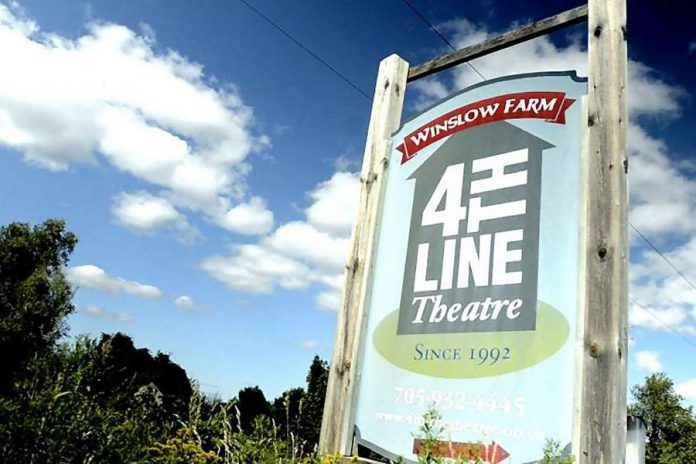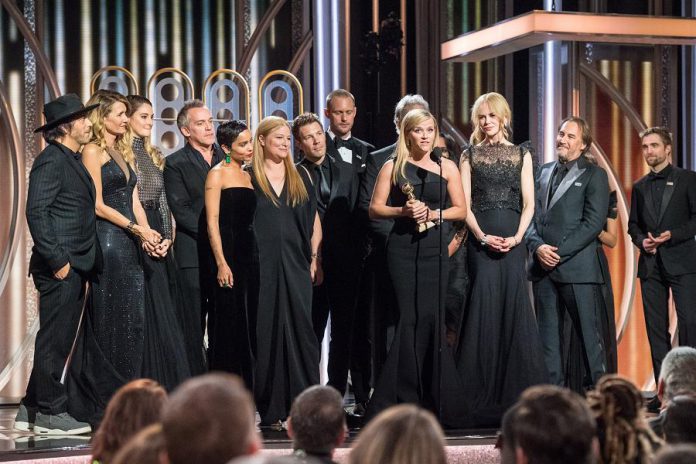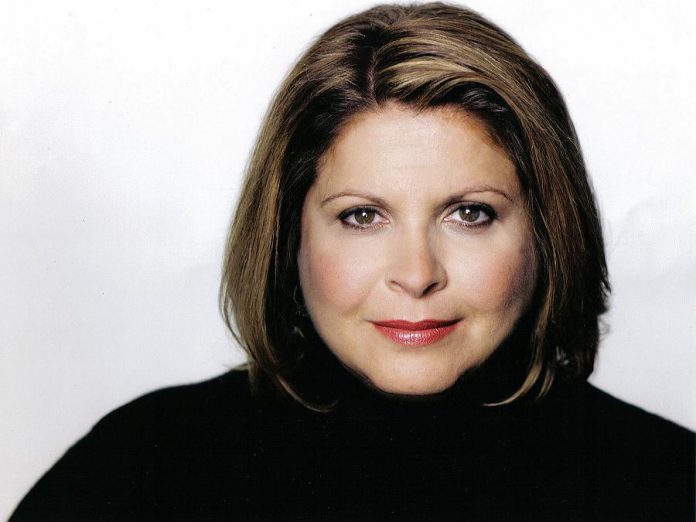
At the Golden Globes last night (January 7), the issue of sexual harassment dominated the ceremony, with stars wearing black and various presenters and recipients using the opportunity to express solidarity with victims.
Host Seth Meyers opened the awards by saying “Welcome ladies and remaining gentlemen. It’s 2018 and marijuana is finally allowed and sexual harassment finally isn’t. For the male nominees in the room tonight, this is the first time in three months it won’t be terrifying to hear your name read out loud.”
Meyers was of course referring to the flood of sexual harassment accusations that began with Hollywood film mogul Harvey Weinstein and then spread like wildfire to include various male actors, sports figures, and other celebrities, prompting the #MeToo movement on social media where women recounted their own experiences of sexual harassment.

In Canada, recent accusations by four women of sexual harrasment against Albert Schultz, former artistic director of Toronto’s Soulpepper Theatre, continue to dominate the headlines. Just today, 280 artists — including actor Mia Kirshner, filmmaker Sarah Polley, and author Ann-Marie MacDonald — signed an open letter supporting the four women, calling on Soulpepper’s board to “acknowledge the harm these women, and others, have suffered.”
While there have been no accusations of sexual harassment yet within the local arts community, it could only be a matter of time.
That’s why Kim Blackwell, Managing Artistic Director at 4th Line Theatre in Millbrook, has written an anti-sexual harassment for her organization, which was unanimously approved by the 4th Line Theatre board in November.
“4th Line has already had in place a harassment and bullying policy,” Kim tells me. “But at the end of October, with the news of the Harvey Weinstein situation and the Me Too movement, I felt we needed to have a clear ‘no tolerance of sexual harassment’ policy in place.”

Kim says the policy communicates to all 4th Line Theatre employees, both permanent and seasonal, that sexual harrasment in any form — from unwanted physical or verbal activity to sexual comments of any kind — will not be tolerated.
“Sexual harassment is a prevalent issue in the arts community and we needed to communicate that 4th Line Theatre has zero tolerance,” she says.
Kim recently shared the policy on Facebook, where she wrote “Every single person working at the theatre will receive this document as a hard copy and electronically. And believe me when I say it will be the law of the land.”
You can read the full policy below.
“Since posting online about our policy on my personal Facebook page, I’ve had many colleagues in the arts community thank me and indicate that they would potentially be using our policy in their own organizations,” Kim says.
With the new policy in place, I asked Kim how she would respond if a claim of sexual harassment was brought to her attention by an employee.
“I would consult with our board and allow them to guide us forward on this,” she says. “We have HR and legal expertise on the board and I would rely on their guidance.”
She also says that Kawartha Sexual Assault Centre (KSAC) would be a valuable resource. 4th Line is currently working with the organization in advance of the theatre company’s staging of Who Killed Snow White? this summer, a play written by Judith Thompson which Kim is directing.
“There are potential triggers in this play and we want to be prepared,” Kim explains. “We hope to have KSAC resources embedded in our process for the company, and potentially on site during performances as well.”
Who Killed Snow White? tells the story of a 15-year-old girl who, after being sexually assaulted at a party, endures additional victimization when photos of the assault are posted on social media. There was a reading from the play at a KSAC event in June 2016 — a full year before sexual harassment came to dominate the headlines.
The world premiere of Who Killed Snow White? takes place from August 6th to 25th at the Winslow Farm in Millbrook. Tickets for the summer season go on sale on February 12th, but you can can buy gift certificates now. For more information, visit www.4thlinetheatre.on.ca.
4th Line Theatre’s Anti-Sexual Harassment Policy
4th Line Theatre is committed to providing a workplace that is free from sexual harassment. Sexual harassment in the workplace is against the law and will not be tolerated. When 4th Line Theatre receives an allegation of sexual harassment, it will take prompt and appropriate corrective action.
What Is Sexual Harassment?
Sexual harassment is a type of discrimination based on sex. When someone is sexually harassed in the workplace, it can undermine their sense of personal dignity. It can prevent them from earning a living, doing their job effectively, or reaching their full potential. Sexual harassment can also poison the environment for everyone else. If left unchecked, sexual harassment in the workplace has the potential to escalate to violent behaviour.
Some examples of sexual harassment are:
- asking for sex in exchange for a benefit or a favour
- repeatedly asking for dates, and not taking “no” for an answer
- demanding hugs
- making unnecessary physical contact, including unwanted touching
- using rude or insulting language or making comments toward a person
- calling people sex-specific derogatory names
- making sex-related comments about a person’s physical characteristics or actions
- saying or doing something because you think a person does not conform to sex-role stereotypes
- posting or sharing pornography, sexual pictures or cartoons, sexually explicit graffiti, or other sexual images (including online)
- making sexual jokes
- bragging about sexual prowess.
4th Line Theatre’s Responsibilities under this Policy:
If 4th Line Theatre receives an allegation of sexual harassment, or has reason to believe sexual harassment is occurring, it will take the necessary steps to ensure that the matter is promptly investigated and addressed. If the allegation is determined to be credible, the Theatre will take immediate and effective measures to end the behaviour. The Theatre is committed to take action if it learns of possible sexual harassment, even if the individual does not wish to file a formal complaint.
The Managing Artistic Director and the General Manager are the main contact point for questions or concerns about sexual harassment. They have a responsibility for investigating or overseeing investigations of alleged sexual harassment. They are committed to ensuring that all investigations of sexual harassment are conducted in a prompt, thorough and impartial manner. If the Managing Artistic Director or General Manager is the harasser then the allegation must be taken directly to the Board of Directors.
Supervisors and other responsible Theatre officials who observe, are informed of, or reasonably suspect incidents of possible sexual harassment must immediately report such incidents to the Managing Artistic Director or the General Manager, who will either initiate or oversee a prompt investigation. Failure to report such incidents will be considered a violation of this policy and may result in disciplinary action.
The Theatre will seek to protect the identities of the alleged victim and harasser, except as reasonably necessary (for example, to complete an investigation successfully). The Theatre will also take the necessary steps to protect from retaliation those employees who in good faith report incidents of potential sexual harassment. It is a violation of both provincial law and this policy to retaliate against someone who has reported possible sexual harassment. Violators may be subject to discipline.
Employees who have been found by the Theatre to have subjected another employee to unwelcome conduct of a sexual nature, whether such behaviour meets the legal definition of sexual harassment or not, will be subject to discipline or other appropriate management action. Discipline will be appropriate to the circumstances, ranging from a letter of reprimand through suspensions without pay of varying lengths to separation for cause. A verbal or written admonishment, while not considered formal discipline, may also be considered.
Employees’ Rights and Responsibilities under this Policy:
Any employee who believes he or she has been the target of sexual harassment is encouraged to inform the offending person orally or in writing that such conduct is unwelcome and offensive and must stop.
If the employee does not wish to communicate directly with the offending person, or if such communication has been ineffective, the employee has multiple avenues for reporting allegations of sexual harassment and/or pursuing resolution.
Employees are encouraged to report the unwelcome conduct as soon as possible to a responsible Theatre official. It is usually most effective — although it is not required — that the official be within the employee’s supervisory chain. Responsible Department officials include first- or second-line supervisors, the offending person’s supervisor, the Managing Artistic Director or the General Manager or Chair and Vice-Chair of the Board of Directors.



























